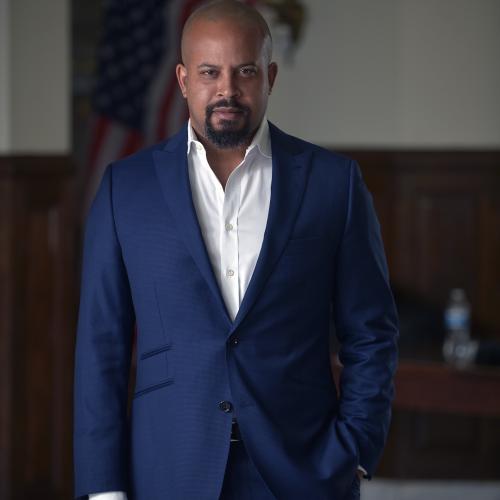Bachelor of Arts (B.A.)
Wesleyan University
1993

Lucius T. Outlaw III is a professor of law at Howard University School of Law. In addition to teaching criminal law and justice courses, Professor Outlaw is the supervising attorney of the law school’s Criminal Justice Clinic, where students represent indigent clients charged with misdemeanor offenses in D.C. Superior Court.
Directly prior to joining the law school, Professor Outlaw was an Assistant Federal Public Defender with the Federal Public Defender’s Office of Maryland for eight years. As an AFPD, Professor Outlaw represented indigent clients charged with a variety of federal criminal offenses, especially fraud, political corruption, violent, firearm, and drug offenses. In 2013, Professor Outlaw was detailed to the United States Senate for one year to serve as counsel in the Judiciary Committee office of Senator Richard Durbin (D-Illinois). For the last two years of his tenure at the federal defender’s office, Professor Outlaw served as Senior Litigation Counsel. In that role, Professor Outlaw assisted with the management of the office’s staff, caseload, recruitment and hiring, attorney training, and policy setting and implementation.
Professor Outlaw started his legal career as an associate with Williams & Connolly LLP in Washington, D.C. (2001-2004) and then with Mayer Brown LLP’s Washington, D.C. office (2004-2010). At Mayer Brown, Professor Outlaw was promoted to partner in 2009.
Professor Outlaw is a graduate of Wesleyan University (B.A.), the George Washington School of Political Management (M.A.), and the University of Pennsylvania Law School (J.D.).
Wesleyan University
1993
The George Washington University - Graduate School of Political Management
1996
University of Pennsylvania Carey Law School
2001
Read: DBK News | https://dbknews.com/2025/03/13/maryland-bill-penalty-gun-minors-general-assembly/
Read: The Quad | https://wcuquad.com/6023735/op-ed/angela-davis-speaks-to-swarthmore-and-activists-proof-that-there-is-beauty-in-struggle/
Read: CBS News | https://www.cbsnews.com/news/attorneys-deadline-jan-6-prosecutions-trump/
Read: NPR | Howard students help a rapper request a new trial after lyrics were used as evidence
Through Utah v. Strieff, the Supreme Court has added to law enforcement’s arsenal of stripping people of their citizenship and humanity. This article strives to add to the growing criticism of Strieff in three ways. First, it adds to the chorus of work exposing and criticizing the flawed legal reasoning of the majority opinion. Next, by using Baltimore, Maryland’s recent policing history, this article shows how racially targeted dragnet policing was already a fact of life pre-Strieff for many black residents of our cities, and how this discriminatory policing tactic is fortified and encouraged by Strieff. Finally, this article explains why Justice Thomas’s claim that his opinion will not lead to increased invidious dragnet policing because of the threat and availability of civil liability is misguided and divorced from reality.
One issue that is lost in the current discussions about criminal justice reform is how throughout federal sentencing law and practice, drug offenses are pervasively linked to violent offenses for the purposes of lengthening prison sentences. Throughout federal criminal statutes, sentencing guidelines and policies, drug crimes and violent crimes are not only treated equally, but also interchangeably to increase a defendant’s prison sentence. This interchangeable equivalence is ingrained in federal criminal statutes and sentencing guidelines providing some of the lengthiest terms of imprisonment. If we are truly serious about reducing our over-reliance on imprisonment and confronting the disparities tied to the “war on drugs” and federal drug policies, then an action-item that must be on the agenda is de-coupling violent conduct with non-violent drug conduct for sentencing purposes. This article discusses one such policy – the career offender guideline – as an emblematic example of the wayward approach of equating drug offenses with violent offenses.
Many commentators and scholars have written how acquitted conduct sentencing violates the intent and spirit of the fifth and Sixth Amendments. This article takes this common analysis. One step further, by arguing that a quartet of Supreme Court Sixth Amendment cases are a Constitutional bar to acquitted conduct sentencing.
Larry Pfeiffer, director of the Hayden Center, Lucius Outlaw Howard University associate law professor, and CBS News national security contributor Michael Morell, former CIA deputy director, discuss how classified documents should be handled, including by outgoing administrations.